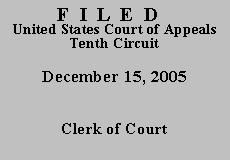

| UNITED STATES OF AMERICA, |
(D.C. Nos. 2:02-CV-76-DB and
2:01-CR-56-DB |
Before BRISCOE, LUCERO and MURPHY, Circuit Judges.
In 1999, Borrayo was convicted in Utah state court of forgery. He received an indeterminate sentence of zero to five years but was deported to Mexico after serving only nine months in jail. In 2001, Borrayo pleaded guilty to illegally reentering the United States in violation of 8 U.S.C. § 1326(a). The district court concluded that Borrayo's 1999 state conviction was an aggravated felony and enhanced his sentence pursuant to 8 U.S.C. § 1326(b). Borrayo was sentenced to a term of seventy-seven months' imprisonment and three years' supervised release. Borrayo did not bring a direct appeal but filed the instant § 2255 motion on January 29, 2002 seeking to set aside his § 1326(a) conviction.
In his § 2255 motion, Borrayo argues that his § 1326(a) conviction for illegal reentry is improper because his initial deportation was unlawful. Specifically, Borrayo asserts that he was denied an effective opportunity to appeal the removal order because his waiver of his appellate rights was not knowing and voluntary. He contends that he was not informed of the availability of discretionary relief from deportation when he signed the waiver. Borrayo also argues that his 1999 state conviction is not an aggravated felony within the meaning of 8 U.S.C. § 1101(3)(43) and that his attorney provided constitutionally ineffective assistance by failing to challenge the characterization of his state conviction as an aggravated felony. Borrayo also argues that his sentence violates United States v. Booker, 125 S. Ct. 738 (2005).
The district court rejected Borrayo's argument that his state conviction is not an aggravated felony. Relying on 8 U.S.C. § 1101(a)(43)(R), the court concluded the term "aggravated felony" includes Borrayo's 1999 state conviction because it was "an offense relating to commercial . . . forgery . . . for which the term of imprisonment is at least one year." The court determined that the length of Borrayo's indeterminate state sentence was measured by the maximum possible term of imprisonment. See United States v. Reyes-Castro, 13 F.3d 377, 379-80 (1995). The district court's rejection of Borrayo's state conviction claim also resolved the ineffective assistance claim. The court then concluded Borrayo failed to demonstrate that the waiver of his right to appeal his removal was not knowing and voluntary. In the alternative, the court determined that Borrayo was not eligible for discretionary relief and, thus, he could not demonstrate he was prejudiced by his failure to appeal. See 8 U.S.C. § 1228(b)(5) ("No alien described in this section shall be eligible for any relief from removal that the Attorney General may grant in the Attorney General's discretion."). Finally, the court rejected Borrayo's Booker argument on the merits. In his application for COA and appellate brief, Borrayo abandons his ineffective assistance and Booker arguments. He does, however, challenge the district court's conclusions that his state conviction is an aggravated felony and that he was not prejudiced by his failure to appeal his removal order.
To be entitled to a COA, Borrayo must make "a substantial showing of the denial of a constitutional right." 28 U.S.C. § 2253(c)(2). To make the requisite showing, he must demonstrate "that reasonable jurists could debate whether (or, for that matter, agree that) the petition should have been resolved in a different manner or that the issues presented were adequate to deserve encouragement to proceed further." Miller-El v. Cockrell, 322 U.S. 322, 336 (2003) (quotations omitted). In evaluating whether Borrayo has satisfied his burden, this court undertakes "a preliminary, though not definitive, consideration of the [legal] framework" applicable to each of his claims. Id. at 338. Although Borrayo need not demonstrate his appeal will succeed to be entitled to a COA, he must "prove something more than the absence of frivolity or the existence of mere good faith." Id.
Having undertaken a review of Borrayo's application for a COA and appellate filings, the district court's order, and the entire record on appeal pursuant to the framework set out by the Supreme Court in Miller-El, this court concludes that Borrayo is not entitled to a COA. The district court's resolution of Borrayo's § 2255 motion is not reasonably subject to debate and the issues he seeks to raise on appeal are not adequate to deserve further proceedings. Accordingly, this court denies Borrayo's request for a COA and dismisses this appeal.
Entered for the Court
CLERK, COURT OF APPEALS
By
Deputy Clerk